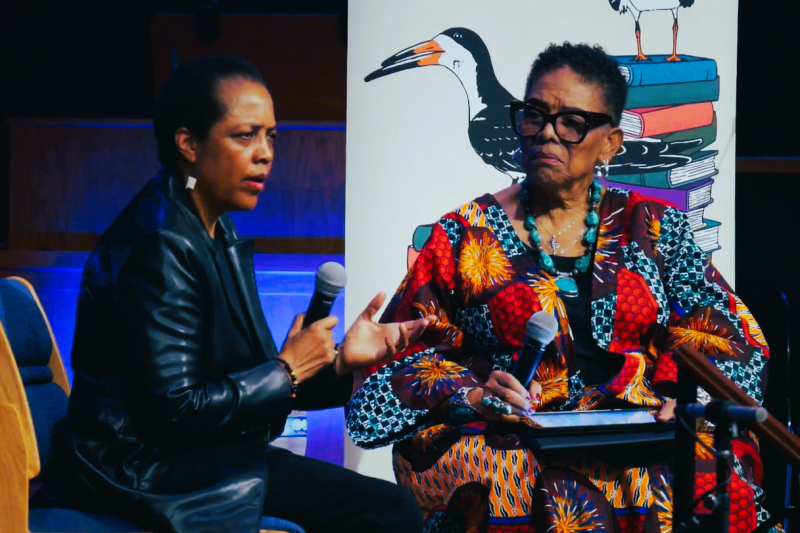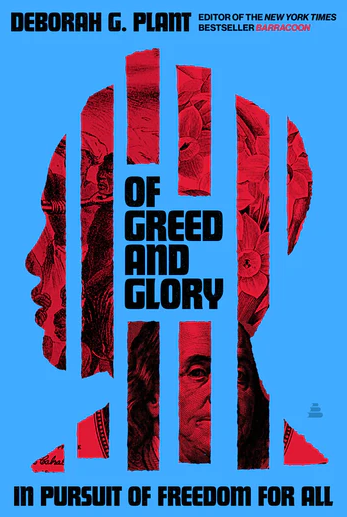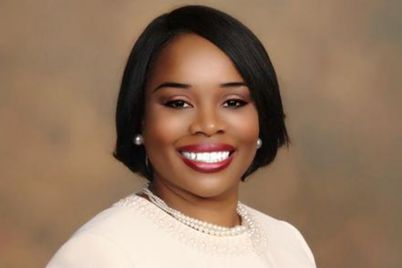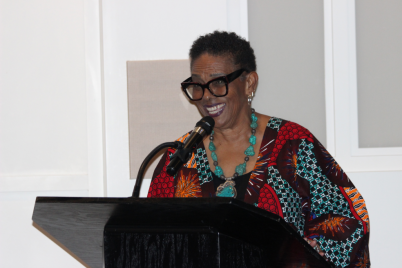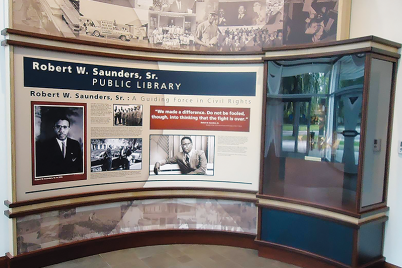Gwendolyn Reese, president of the African American Heritage Association, sat down with Dr. Deborah G. Plant to discuss her new book, “Of Greed and Glory: Black Freedom and the American Pursuit of Popular Sovereignty” on Jan. 19 at Allendale United Methodist Church.
BY FRANK DROUZAS | Staff Writer
ST. PETERSBURG — Scholar, writer and literary critic Dr. Deborah G. Plant discussed her new book, “Of Greed and Glory: Black Freedom and the American Pursuit of Popular Sovereignty,” last month at Allendale United Methodist Church.
Tombolo Books, in partnership with the African American Heritage Association and Allendale United Methodist Church, presented the event with Gwendolyn Reese, president of the AAHA, serving as host.
Plant, specializing in the life and works of Zora Neal Hurston, is the editor of the New York Times bestselling “Barracoon: The Story of the Last Black Cargo,” Hurston’s last work. She played an instrumental role in founding the University of South Florida’s department of Africana Studies, where she chaired the department for five years.
Plant said she started out writing a book that would compare historical and contemporary forms of slavery and forced servitude, with only a few pages devoted to her brother. In time, though, much of the work’s focus shifted to include her younger brother Bobby, who is incarcerated.
“That’s the thing that got me the most,” she revealed. “To look at what had happened to my brother and to me, with my brother, and our family; to look at it without the lens of some intellectualism.”
Plant said that her younger brother Bobby made some bad choices, and one of those choices was to be abusive to his fiancée. He was charged with several counts of battery, kidnapping, and rape. Plant said he was found guilty and offered a plea deal where Bobby had to not only plead guilty to battery but also to kidnapping and simple rape, which carried a sentence of 25 years.
If her brother did not take that plea, the prosecutor would charge him with aggravated rape, which carries a life sentence without the possibility of parole. Bobby refused to take the deal.
“He really believed that the evidence would prove him innocent,” Plant said, adding that he took responsibility for the battery charge. “He said he hadn’t committed any rape, and he wasn’t going to plead guilty to that and be stigmatized as a rapist.”
Plant explained that the state’s doctor who did the rape kit said that not only had the young woman not been raped, but there was also no indication that sex had taken place. Despite this, Bobby was found guilty on all counts. The public defender “basically did nothing,” Plant said, and the prosecutor said, “he was going to make it stick, and he did.”
“This so-called justice system, well, we have a lot of work to do if we want to make it just,” she said, adding that she has had to adjust her relationship with her brother since his incarceration.
Before being imprisoned, Bobby was the kind of brother who would throw his sister welcome-home parties when she returned from college, cook red beans and rice or gumbo for her or just laugh and talk with her.
“He was always smiling … he was like that all the time,” recalled Plant. “I lost this.”
In the book’s prologue, Plant wrote: “Because my brother was locked up, and we visited him, I didn’t realize how I was also locked up with him.”
Bobby is serving his sentence in Angola — officially the Louisiana State Penitentiary, the largest maximum-security prison in the country that has a reputation for brutality and violence — and has been there for nearly a quarter of a century.
Throughout the book, Plant connects her brother’s story and her own experience with the correlation between slavery and the current system of punishment.
“There’s this web of unconsciousness around how people wind up in a place like Angola,” she said. “But it’s like Angola was waiting for them.”
The whole system of slavery and the slave plantation revolved around keeping “human stock” to produce and do the work, Plant said. After the Civil War, when labor wasn’t free anymore, those controlling the system found another way to enslave, which was not an institution but a “mindset.”
That mindset is that someone is superior and someone is inferior. Someone is called master, and you are property. They own you; they control you; they can extract your labor.
“This mindset did not die on the battlefields of the Civil War,” she averred. “It continued. And not only did it continue, it’s codified in the U.S. Constitution, that 13th Amendment that says slavery is abolished, [but] in the middle of that same sentence, it says ‘except as punishment for crime.'”
This facilitated the control of the “so-called masterclass” post-Civil War. Convict leasing, sharecropping, tenant farming and debt peonage became other forms of enslavement.
“Why? To control the labor, to extract the labor, to increase profits, to dominate, to live the privileged life that having other people produce your profit for you is what you’re in pursuit of, and you have [the] political authority to make that happen.”
Located on land that was originally an 8,000-acre plantation, Angola took its name from the homeland of its former enslaved population. Once the convicts came under the control of the state in that prison, the state had prisoners doing the same work as the enslaved once did.
“When my brother first went there, he said he worked out in the field for about a year and a half,” Plant said, “cultivating whatever the crop was at that point in time and chopping grass and digging ditches and trying to stay out of the way of snakes … and you don’t get paid.”
This is going on right now, she stressed. If the imprisoned get paid at all, it is only a few cents an hour, so they depend upon their families, making it hard for these families to build wealth. Plant said when she or other members of her family send Bobby money each month, “That’s our wealth going to the state!” she said.
“I couldn’t help but think about those people during historical slavery who tried to get their family out of slavery. You had to buy them; I had to buy my brother.”
Reese brought out a gut-wrenching passage in “Of Greed and Glory” that states when women were pregnant or impregnated while in prison in Baton Rouge, their babies became state property. At the age of 10, these children could be auctioned on the steps of the county courthouse, and the proceeds at that time would go to fund schools for white children.
“It just really shows how closely enslavement is tied up in the prison system in this country today,” said Reese.
Plant said the modern-day parallel is when mothers and fathers are incarcerated for long periods or even life; many times, their children become victims of socioeconomic circumstances and often repeat what happened to their parents.
In chapter eight, Plant talks about the social construct of patriarchy and the parallels between contemporary society and enslavement. As slavery depended upon a patriarchal society where the man was the head, today, there exists a “toxic masculinity” and a “will to dominate,” Plant said.
“Part of that is about asserting authority. Being dominant, being competitive, aggressive, offensive, violent, as necessary and the most important part — to be in control.”
She asked her brother about his role in being incarcerated, and he explained: “I was the one working; I was the man, I wore the pants, and it was my way or the highway.”
In patriarchal societies, men also dominate other men, and today, the majority of those incarcerated are male. She said it is a way for certain men to keep other men in check.
“The idea is that there’s a hierarchy here, and in America, that’s the white male. Those who assume that mentality keep everyone else in check. And then the men, wherever they fall in the hierarchy, keep the women in check,” she said, adding that Fannie Lou Hamer is but one example, as the men of Mississippi wanted to “shut up” this Black female activist who fought for voting rights and the desegregation of the Democratic Party.
Plant maintains this master-slave hierarchy is still in place.
“It hasn’t gone anywhere,” she said. “We’re still living in that paradigm, and until we become conscious of not only living it but also reproducing it, we’re going to keep reproducing it until we wake up to really experience something I call our personal sovereignty and look to help others wake up to that as well.”
Plant noted that a bill went before Congress to remove the “except as punishment” exception from the 13th Amendment, but it did not pass. She hopes it will be on the ballot again as some states have already stricken such wording from their own constitutions.
Plant also encouraged the audience to read the 10th Amendment so that they could spot being gaslighted by the government. The 10th Amendment addresses the overreach of the federal government, but, she said, we don’t have protection from the overreach of the state.
“But we are supposed to because the powers that are not delegated to the federal government are delegated to the state or the people, and that’s us. But they don’t tell you that.”
She feels that people and organizations such as Reese, Tombolo Books, the NAACP, the American Civil Liberties Union, Equality Florida and others are our protection from the overreach of the state because they inform and step in when the state gets too intrusive.
Plant said you see the dominating, controlling forces of the patriarchy at the state level when they try to prevent citizens from voting.
“They intimidate you at the polls. They tell you you can’t even give someone a bottle of water, or else you’ll be criminalized. That’s intimidation, that’s control, that’s patriarchy.”
Reese praised “Of Greed and Glory,” noting that “anything that impacts you so viscerally, that is so strongly speaking of the injustices in this country … is a must-read.”
Locally, you can pick up a copy of “Of Greed and Glory: Black Freedom and the American Pursuit of Popular Sovereignty” at Tombolo Books or online where books are sold.

